“On partnership, universal values, and the rule-based international order”
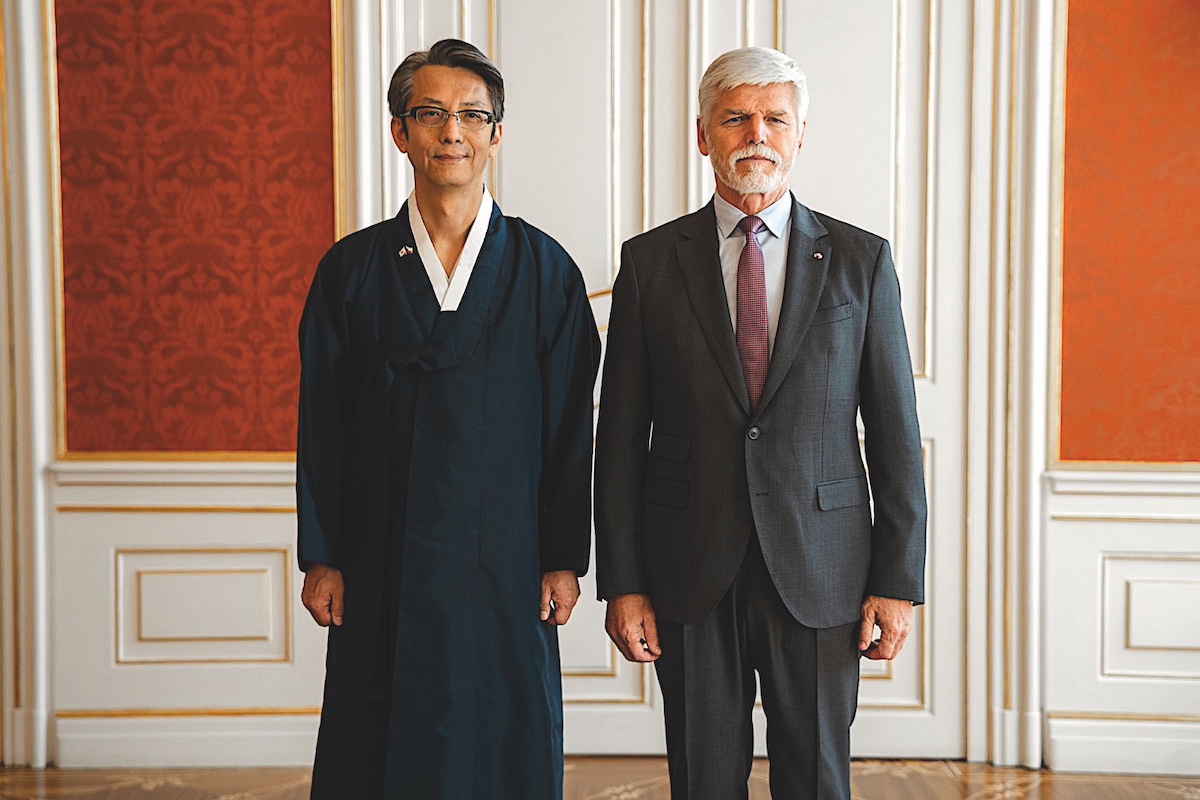
H.E. Mr. Youngki Hong, Ambassador of South Korea and Mr. Petr Pavel, President of the Czech Republic
Text: Martina Hošková and M. Zisso; Photo: Archive
Should we pick but one thought that comes to mind when pondering on the words of H.E. Mr. Youngki Hong, Ambassador of Korea, it would be “continuum”. “I am grateful for what our fathers‘ generation achieved, and proud of what our generation did. I am also keen on what we should do for our children’s generation, facing new global challenges,” says the Ambassador. “The more I learn, the more I see that things are inter-connected. I am truly glad that Czechia and Korea are on the same page, supporting universal values and a rule-based international order.”
Can you tell our readers about yourself?
I was born in Seoul, in the Republic of Korea. My generation of Koreans has gone through a great transition from a poor, authoritarian society to a thriving democracy. Fast economic growth started in the 1960s, as the Korean government was single-mindedly focused on economic development, heavily investing in an export-driven economy, infrastructure, and education. During my days at Seoul National University in the 1980s, Korean colleges and universities were a bastion of students trying to push for a change in our society, with different political ideas and divergent worldviews.
By the early 1990s, Korea achieved both unprecedented economic development and a thriving liberal democracy. When I joined the Ministry of Foreign Affairs in 1991, I had no experience with even a single foreign trip. Korea and its culture were little known outside Asia. Now, things are much different, and, to my surprise, I have found Korean food, music, and TV dramas widely popular in many countries. I am grateful for what our fathers‘ generation achieved, and proud of what our generation did. I am also keen on what we should do for our children’s generation, facing new global challenges.
I served as Director General of the International Economic Bureau at the Ministry of Foreign Affairs, working mainly in the areas of trade negotiations with major trading partners such as the US, EU, and China. I participated in multilateral negotiations in the World Trade Organization (WTO) and the Asia-Pacific Economic Cooperation (APEC) in the heyday of multilateralism. I spent many years in London, Paris, and Geneva, and some years in Ghana and Kuwait. I am interested in history and culture, so I love spending most of my days meeting people with various backgrounds and acquiring new knowledge and insights. The more I learn, the more I see that things are inter- connected.
Personally, I am a father of two daughters, and I am currently living in Prague with my wife, who really loves everything about the Czech Republic.
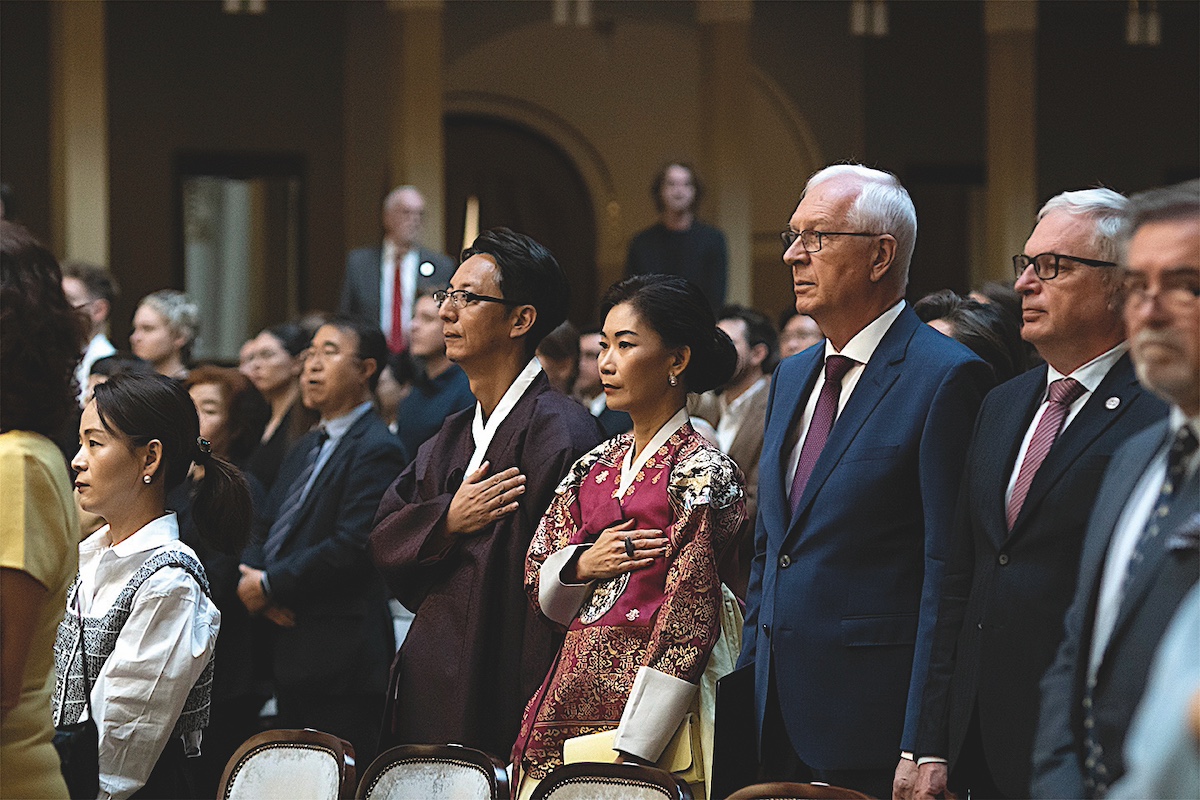
National Day celebration, from left: H.E. Mr. Youngki Hong, Ambassador of South Korea with his spouse and Prof. Ing. Jiří Drahoš, 1st Vice President of the Czech Senate
What was your path to becoming an ambassador?
My academic background is in economics and law, but I have always loved history. Meeting new people and getting to understand cultural differences give me joy all the time. I know there are many layers in every society, like in every human being. No black-and-white division. When I graduated, Korean society was making a transition from an authoritarian government to a country of democracy, economic openness, and globalization. At this critical time, I decided to become a diplomat to see the changing world. It was a great pleasure, and rewarding to be engaged in crucial negotiations such as a free trade agreement with the United States to globalize and liberalize the Korean economy. The beauty of a rule-based international order was that you could negotiate things with big powers on an equal footing – or, precisely speaking, almost equal. I also participated in multilateral trade negotiations at the WTO in Geneva, and watched the rise and fall of the WTO dispute settlement system. In retrospect, all these things look so surreal now. The rule-based international system that once looked so dear and so prevailing is now facing great challenges on many fronts.
I am truly glad that Czechia and Korea are on the same page, supporting universal values and a rule-based international order. When I was designated as the Korean Ambassador to the Czech Republic after serving as the Korean Ambassador to Kuwait, and later as Korea’s Arctic Ambassador, I was truly amazed. Czechia is a place of great culture and history for Korea, and both Korea and Czechia have lots of bilateral cooperation in tourism, trade, and investment. I am sure I can have my best adventure here.
It has only been a few months since you arrived in the Czech Republic. What are your impressions so far?
The Czech Republic is a nation with a rich history, a vibrant culture, and warm-hearted people. It is renowned for its wealth of historical landmarks, including the stunning Prague Castle, Charles Bridge, and the beautiful Old Town Square. On the first day of my new post, the view of Prague from the window of the hotel near the Old Town was so mesmerizing that, in that instant, my wife and I fell in love with Prague.
The two countries are based on the same democratic values and principles. In 1918, Czechoslovakia, led by President T. G. Masaryk, gained independence, and the First Czechoslovak Republic was born based on democratic ideals and principles. On March 1st, 1919, all Koreans expressed their strong desire for independence, which led to the establishment of the Korean Provisional Government. There were some interactions between Koreans and Czechs around 1920, when the Czechoslovakian army in Vladivostok sold their weapons to the Korean independence army. In 1945, Korea was liberated from Japanese colonial rule and began a long and painful journey to become a peaceful and prosperous country, with a thriving democracy and strong economy. The Czech people went through a similar turbulent journey and built a prosperous society, with democratic ideals and thriving cultural traditions.
Over the last four months, I have visited local cities, experienced the unique beauty of each region, and met their leaders. I have found them to be friendly and open to building strong ties with Korea.
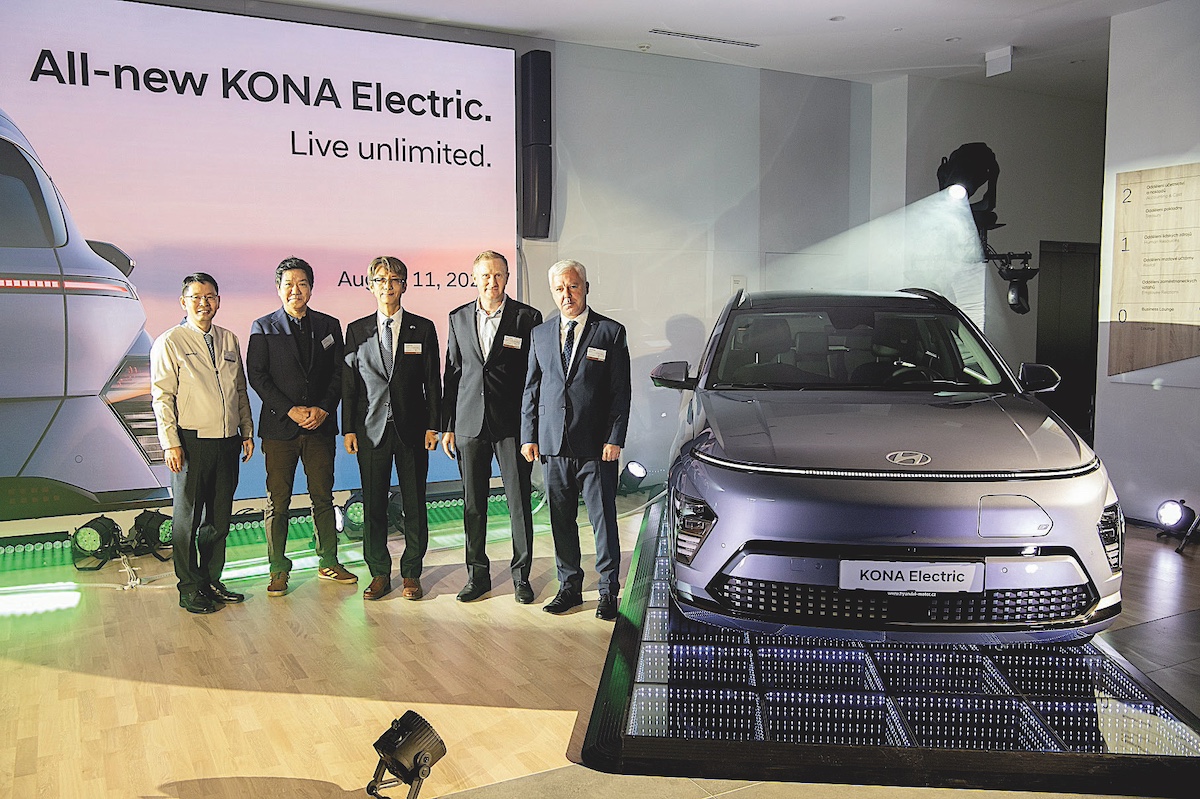
H.E. Mr. Youngki Hong, Ambassador of South Korea with the management of Hyundai Czech Republic
Do you personally enjoy the lifestyle of an ambassador?
I have been intellectually curious since I was young. Whenever I was appointed to a new position as a diplomat, I studied the history, society, and culture of the country ceaselessly and with great interest.
The Czech Republic is a country that has a lot for me to learn from. Whenever I walk through the streets of Prague, stories about Charles IV, Jan Hus, and Jan Žižka enchant me with such powerful vividness. While here, I also study and constantly read books in order to look at history in a broader European context. Traces of Rudolf II, the Thirty Years‘ War, and Mozart that I see in Prague come to me with a new meaning and perspective. Most of all, I am really fascinated by the achievements of President T. G. Masaryk, with his humble background, honesty, leadership, and courage to stand by principles and ideals.
What is the most difficult part of being an ambassador?
Being an ambassador requires a delicate balance between representing the interests of my home country and respecting and cooperating with the host country. The work of the ambassador is never routine – something unexpected always happens. I always seek the opinions of the headquarters or of experts to resolve these unexpected situations, yet there are some occasions when I have to decide and act at my own discretion. Sometimes, it is quite difficult to see things from a wider perspective. I should fully understand the global geopolitical issues and context that are not limited to the region of Central Europe. When I was serving in Geneva in the past, the governments and diplomats from all over the world were optimistic about the integration of the world. Today, however, there are major geopolitical risks that have arisen worldwide. I think these risks are making every ambassador’s job more challenging.
Korea is an industrial power. Can you tell us more about the cooperation with the Czech Republic in this sphere?
The relationship between Korea and the Czech Republic has been growing stronger in recent years. Both countries have worked collaboratively on various levels – from trade and technology to cultural exchange programs – which has been a testament to the positive trajectory of our diplomatic ties. Another great similarity Korea and the Czech Republic share is that both have strong manufacturing bases. Recently, the Czech Republic has been very interested in fostering high-tech industries such as Small Modular Reactor (SMR), electric vehicles, batteries, high-speed rails, and drones. Since Korea has strengths in these areas, there is a lot of room for our two countries to cooperate in the future. For example, a Korean company, Doosan, acquired shares of Skoda Power, a Czech company, in 2009. The portion of overseas orders of Skoda Power was only around 30% before the acquisition, but that of Doosan Skoda Power reached 85% last year. This is a good example, demonstrating that we can exert greater competitiveness in the global market with the strengths of the two countries’ companies combined.
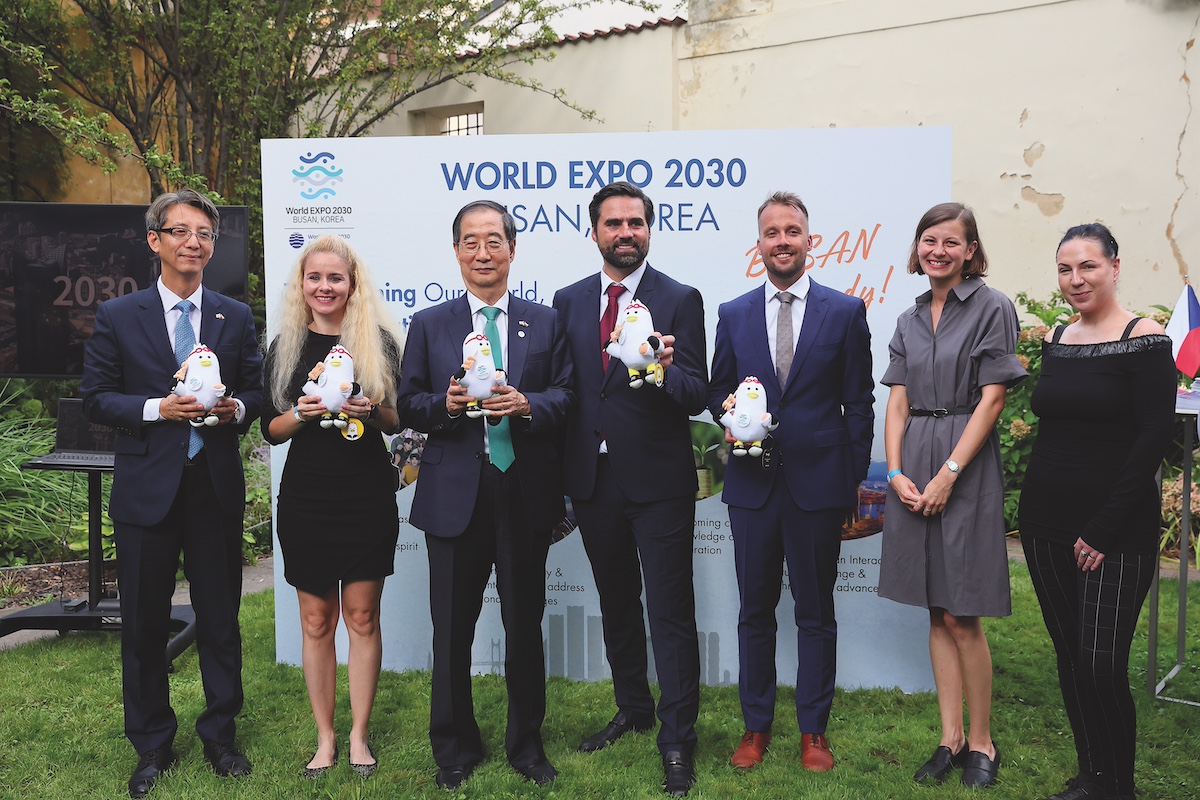
Han Duck-soo, Prime Minister of South Korea (third from left), H.E. Mr. Youngki Hong, Ambassador of South Korea (left), and the bid team of World EXPO 2030 – Busan, Korea
Are there any specific challenges connected to your ambassadorial role in Czechia?
Luckily, the challenges in my ambassadorial role in this country are relatively small due to the alignment of democratic values between Korea and the Czech Republic. I believe that the Czech Republic and Korea, as middle powers sharing universal values and supporting the rule- based international order, can cooperate in various fields to address challenging international issues.
Understanding the Czech culture and language remains important for effective diplomacy. While English is widely spoken, grasping cultural nuances and maintaining language proficiency remain crucial aspects of building trust and intimacy with the Czech people.
Czech and Korean people can use direct flights between our countries. What do you focus on when promoting your country?
As the direct flights between Incheon and Prague resumed in March, many tourists are travelling to and from both our countries, and their interests in each other’s cultures are on the rise.
We are working hard to introduce and share the various aspects of Korean culture to the Czech people through embassy events and social media. These cultural aspects include Korean food, Hanbok (traditional Korean clothing), Korean folk songs, as well as K-pop, movies, and dramas that have gained global popularity through various platforms. Also, I would like to create many opportunities for practical cultural exchanges between the two cultures, beyond simply promoting Korean culture in the Czech Republic. I am currently engaged in discussions with the Czech government regarding the establishment of a Korean Cultural Center in the Czech Republic, aiming to systematically support cultural exchange between our two countries. If this endeavor comes to fruition, it would open up many opportunities for Czechs to experience Korean culture firsthand.
Could you talk more about your own life here in Prague? How do you experience Czech culture?
I try to meet and talk with various people during off-work hours. Following my Czech friends’ recommendation, I am learning Czech folk songs from time to time, such as “Ach synku, synku” and “Lasko ma, ja stunu”. I have found Czech singers like Karel Gott to be really talented. My wife and I are kind of music lovers, and we are trying to visit many concerts and music events as well.
Additionally, I enjoy visiting various local cities (other than Prague) in the Czech Republic, and discovering and experiencing the various attractions of the country. When I visited Telč recently, I was very impressed with the UNESCO World Heritage Site, and by the beautiful scenery in the city.
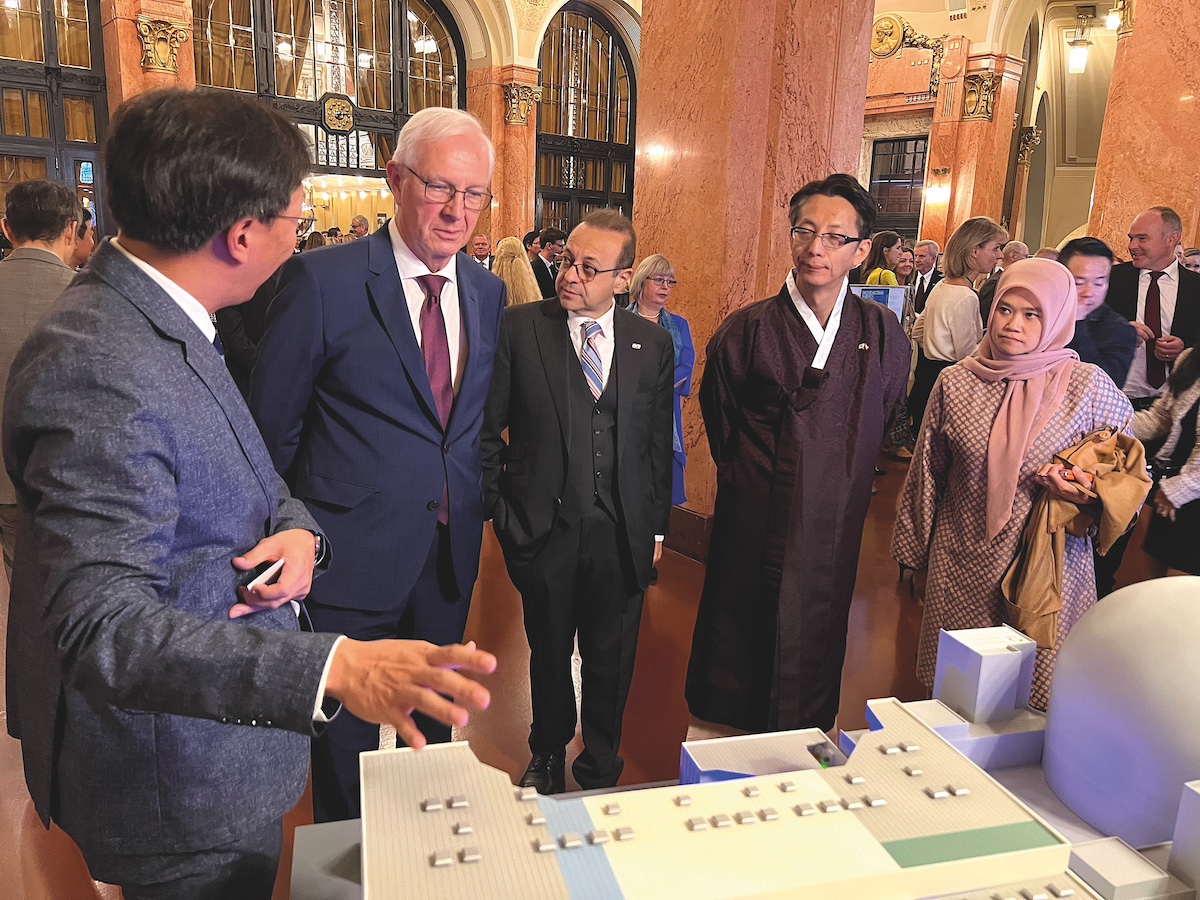
Showing Korea’s bid for the Dukovany nuclear power plant, from right: H.E. Ms. Suzilah Binti Mohd Sidek, Ambassador of Malaysia; H.E. Mr.Youngki Hong, Ambassador of South Korea; H.E. Mr. Egemen Bagis, Ambassador of the Republic of Türkiye; Prof. Ing. Jiří Drahoš, 1st Vice President of the Czech Senate
In conclusion, can you give us some facts to illustrate the state of Czechia-Korea relations?
Korea and the Czech Republic established diplomatic relations in 1990, and agreed to upgrade their relationship to a higher level of strategic partnership in 2015. In fact, Korea was the first Asian country to forge a strategic partnership with the Czech Republic, which clearly proves that we are genuine friends and partners. Currently, the world is confronted by a range of geopolitical challenges and conflicts. At this very moment, it is more important than ever for Korea and the Czech Republic to cooperate as strategic partners in order to address these challenges.
This year marks a critical juncture for both countries, with high-level officials’ visits following the COVID-19 pandemic. The Speaker of the Korean National Assembly visited Czechia in June, following the visit by the Speaker of the Chamber of Deputies of Czechia to Korea in March. Korean Prime Minister Han Duck-soo visited Prague and met with Prime Minister Petr Fiala in September. Finally, President Yoon Suk Yeol met with President Petr Pavel in New York in September.
With this momentum, I look forward to expanding the scope of our bilateral cooperation to nuclear energy and high-tech industries. Busan‘s bid for the 2030 World Expo hosting city is an area in which we wish to rely on Czechia’s support as well. The KHNP’s bid for the Dukovany Nuclear Power Plant is also a very important project, which will upgrade our economic ties to a new level. I sincerely hope that my role and efforts as an ambassador will pave the way for consolidating a stronger relationship between our two countries.

